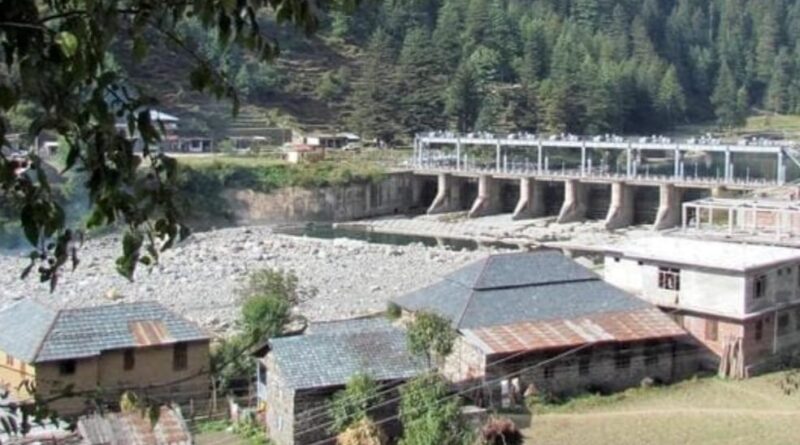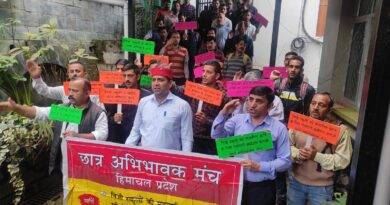Shanta Kumar urges Central to support Himachal’s claim to Shanan power project
Former Himachal Pradesh Chief Minister Shanta Kumar has openly criticized the Central Government’s neutral stance in the ongoing dispute over the Shanan Hydro Power Project, calling it “unjust and unacceptable.” Situated in Jogindernagar in Mandi district, this historic hydroelectric project has been under Punjab’s control for decades, even though the lease with Himachal Pradesh expired in March this year. Despite the expiry, Punjab continues to assert ownership, leading to a legal battle between the two states.
Shanta Kumar has urged Prime Minister Narendra Modi to intervene directly, asserting that Himachal Pradesh deserves rightful ownership of the project under the provisions of the 1966 States Reorganisation Act. Expressing disappointment over Union Power Minister Manohar Lal Khattar’s recent remarks about the Centre’s neutrality, Kumar argued that this “neutral” stance harms smaller states like Himachal, who often face challenges in reclaiming their resources. He pointed out that, despite hosting numerous significant hydropower assets, Himachal Pradesh has frequently been sidelined in resource distribution due to its limited political influence.
The Shanan Hydro Power Project, Asia’s oldest hydroelectric plant, was commissioned in 1932 by British engineer Col. B.C. Batty. Though located in Himachal, the project has remained under Punjab’s control, with a 99-year lease originally signed between the British government and the Maharaja of Mandi. Now that the lease has expired, Himachal Pradesh is renewing its efforts to reclaim the project.
Shanta Kumar emphasized that the 1966 States Reorganisation Act, which redefined state borders and resources, mandates a fair redistribution of assets among the newly formed states. However, while other assets were divided, the Shanan project has remained with Punjab, despite being situated on Himachal’s land. Kumar views this as a historic oversight that has denied Himachal its rightful claim for decades.
Reflecting on his tenure as Chief Minister in 1977, Kumar recalled his own attempts to address the issue with then-Prime Minister Morarji Desai, including protests in Delhi, yet Punjab retained control of the project. He described the Shanan dispute as an example of the injustices smaller states endure when seeking their fair share of resources, drawing parallels to Himachal’s prolonged fight for a fair share in Bhakra Beas Management Board (BBMB) projects.
Since the lease expired, Punjab has filed a petition in the Supreme Court to retain control of Shanan, while the Himachal Pradesh government has engaged top legal experts to advocate for its case. Shanta Kumar commended the state government’s efforts, noting that while legal proceedings are essential, they may not suffice without Central Government support.
Kumar highlighted that as a smaller state with only four MPs in the Lok Sabha, Himachal’s voice often goes unheard amid larger, politically influential states like Punjab. “Our state is rich in natural resources but politically disadvantaged,” he said, urging the Centre to step in to ensure justice for Himachal. According to Kumar, this issue is not just about energy or revenue but about addressing long-standing inequities in the federal system.
For Himachal Pradesh, the Shanan project holds deep historical and economic significance. With a capacity of 110 MW, the project has bolstered Punjab’s energy supply for years. Reclaiming it would mean more than just gaining an energy asset; it would represent Himachal’s assertion of its right to manage resources within its borders.
Kumar’s criticism of the Centre’s neutrality resonates with many in Himachal, who feel that this stance disregards the state’s struggles for fair resource allocation. “Neutrality in this matter is not merely inaction—it is a continuation of the injustice faced by Himachal Pradesh for decades,” he remarked. He called upon Prime Minister Modi to take decisive action, asserting that the Centre’s intervention is essential to reach a fair and lasting resolution in this dispute.
As the legal battle over Shanan continues, the dispute has become a symbol of the challenges smaller states face in securing their fair share of resources. Shanta Kumar’s stance underscores the need for the Central Government to play a more active role in resolving such issues and ensuring fairness in India’s federal system. For now, both states await the Supreme Court’s decision, while Himachal Pradesh hopes for support that might finally grant it control of this significant resource within its territory.



